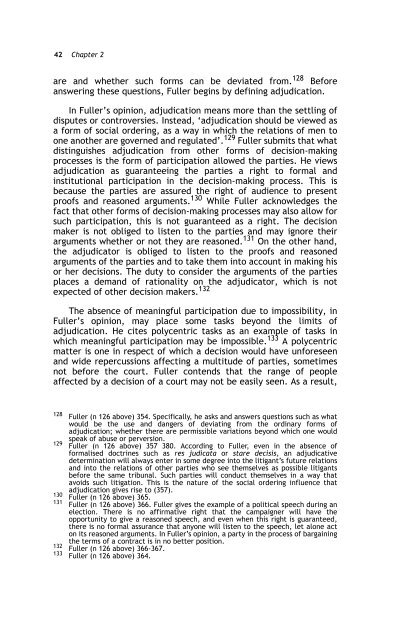LITIGATING SOCIO-ECONOMIC RIGHTS IN SOUTH AFRICA - PULP
LITIGATING SOCIO-ECONOMIC RIGHTS IN SOUTH AFRICA - PULP
LITIGATING SOCIO-ECONOMIC RIGHTS IN SOUTH AFRICA - PULP
Create successful ePaper yourself
Turn your PDF publications into a flip-book with our unique Google optimized e-Paper software.
42 Chapter 2<br />
are and whether such forms can be deviated from. 128 Before<br />
answering these questions, Fuller begins by defining adjudication.<br />
In Fuller’s opinion, adjudication means more than the settling of<br />
disputes or controversies. Instead, ‘adjudication should be viewed as<br />
a form of social ordering, as a way in which the relations of men to<br />
one another are governed and regulated’. 129 Fuller submits that what<br />
distinguishes adjudication from other forms of decision-making<br />
processes is the form of participation allowed the parties. He views<br />
adjudication as guaranteeing the parties a right to formal and<br />
institutional participation in the decision-making process. This is<br />
because the parties are assured the right of audience to present<br />
proofs and reasoned arguments. 130 While Fuller acknowledges the<br />
fact that other forms of decision-making processes may also allow for<br />
such participation, this is not guaranteed as a right. The decision<br />
maker is not obliged to listen to the parties and may ignore their<br />
arguments whether or not they are reasoned. 131 On the other hand,<br />
the adjudicator is obliged to listen to the proofs and reasoned<br />
arguments of the parties and to take them into account in making his<br />
or her decisions. The duty to consider the arguments of the parties<br />
places a demand of rationality on the adjudicator, which is not<br />
expected of other decision makers. 132<br />
The absence of meaningful participation due to impossibility, in<br />
Fuller’s opinion, may place some tasks beyond the limits of<br />
adjudication. He cites polycentric tasks as an example of tasks in<br />
which meaningful participation may be impossible. 133 A polycentric<br />
matter is one in respect of which a decision would have unforeseen<br />
and wide repercussions affecting a multitude of parties, sometimes<br />
not before the court. Fuller contends that the range of people<br />
affected by a decision of a court may not be easily seen. As a result,<br />
128<br />
Fuller (n 126 above) 354. Specifically, he asks and answers questions such as what<br />
would be the use and dangers of deviating from the ordinary forms of<br />
adjudication; whether there are permissible variations beyond which one would<br />
speak of abuse or perversion.<br />
129 Fuller (n 126 above) 357 380. According to Fuller, even in the absence of<br />
formalised doctrines such as res judicata or stare decisis, an adjudicative<br />
determination will always enter in some degree into the litigant’s future relations<br />
and into the relations of other parties who see themselves as possible litigants<br />
before the same tribunal. Such parties will conduct themselves in a way that<br />
avoids such litigation. This is the nature of the social ordering influence that<br />
adjudication gives rise to (357).<br />
130 Fuller (n 126 above) 365.<br />
131<br />
Fuller (n 126 above) 366. Fuller gives the example of a political speech during an<br />
election. There is no affirmative right that the campaigner will have the<br />
opportunity to give a reasoned speech, and even when this right is guaranteed,<br />
there is no formal assurance that anyone will listen to the speech, let alone act<br />
on its reasoned arguments. In Fuller’s opinion, a party in the process of bargaining<br />
the terms of a contract is in no better position.<br />
132<br />
Fuller (n 126 above) 366-367.<br />
133 Fuller (n 126 above) 364.
















